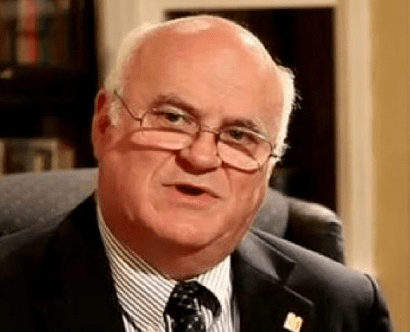
All around us the dark clouds seem to be descending on our society and on our culture. It is clear that our children and grandchildren will grow up to live and work in a world vastly different from our own. It is a world that we can hardly recognize when compared to our own youth or childhood of play, church dinners, afternoon ball games, and family gatherings.
Both the Church and nation seem to be in spiritual and moral decline. We all know this to be true, yet we seem powerless to arrest or slow the slide into the abyss through our behavior, preaching, prayers or protests.
We have done well if we have been able to point our own family to the narrow way and see them progress in the Christian faith, even as the larger society seems headed for the ashbin of history.
David, the sweet hymn writer of Israel, wrote in a time similar to our own. He asked a question which is on many of our minds and resonates with us even today, “If the foundations are destroyed, what can the righteous do?”
David himself was a fugitive from King Saul at the time of writing the Psalms (he became king in a better and improved day). David answers this question with four comforting certainties for the people of God in troubled times.
Isolation from events is impossible (Psalm 11:1-3)
David was tempted to flee and isolate himself completely from his troubled times. We know he did try to escape Saul’s pursuit and his immediate danger. His friends urged him to go even further away saying, “Flee as a bird to your mountain” in the face of the wicked who “shoot secretly at the heart” (11:1-2).
While we should provide for our personal and family’s spiritual and physical security as best we can, is it possible, or even beneficial, to isolate ourselves completely from the trouble that has come upon our nation and the Church? The answer is, no. There is ultimately nowhere we can go on this earth to escape all problems.
Our security is in God alone (Psalm 11:1, 4a)
There is an old saying in the Church that “man’s extremity is God’s opportunity.” Many are even now turning to Jesus Christ for both forgiveness of sins, which is man’s basic need, but also for a sense of hope and personal security that this world cannot provide.
Even as the dark clouds form around us, some also see a silver lining. We must be the ones who speak the gospel and words of hope into the face of the storm. We must provide the balm of Gilead for a suffering people and nation. We may even be on the cusp of a new “Great Awakening.”
Small group evening and morning Bible study-prayer groups are springing up in businesses and plants, on college and public school campuses. Prayer and fasting retreats have found their way back into the church. There is a “fresh obedience” to biblical mandates, Christian families taking responsibility for the education of their own children through home-schooling and Christian schools. Many are seeking God. Many will be saved as the storm clouds brew. Troubled times could add to harvest times.
We are reminded by this psalm “that the Lord is in is holy temple” and “his throne is in heaven” (11:4a). Is this text telling us that God is remote, distant and uncaring? No, this is a principal text to remind us of His ruling sovereignty in the universe. We are secure because he is sovereign.
God cannot be touched by the sinfulness and rebellion of man. He is in a safe place; He is secure. He is security and safety Himself, and because He is all these things, we also are safe and secure.
God will be triumphant in the end, and we reign with Him now and forever. Whatever our lot, we are secure, and we have already won the final victory. Our Savior, the Lord Jesus Christ, has gone on ahead of us to prepare a place for us. And we have a mediator seated at the right hand of God, ever living to make intercession for us through prayer, “we may boldly approach the throne of grace to find mercy and obtain help in time of need” Hebrews 4:16).
God’s justice will prevail (Psalm 11 :4b-6)
In the Church we have largely emphasized God’s mercy and grace because that is our own personal experience, but God is also holy and just. He has a wonderful plan for us, but His justice will be meted out to those who reject Him and flaunt His Word and Law.
Isaiah says wrath is “His strange work,” but it is real nevertheless. Sometimes we even see it acted out; we see His justice operating in this life, here and now. But, if we do not see it in the present, it will certainly come in the eternal future.
We are to pray for mercy and grace for ourselves and our enemies as did Stephen. He was the first martyr, in Acts 7:60, who prayed, “Lord, do not charge them with this sin.” In some cases, we are to pray against the “institutionalized” enemies of God. (See Acts 4:27-31). Also, in some rare cases, Paul the Apostle prayed and actually spoke against specific individuals who were harming the Church (See 1 Timothy 1:20, 2 Timothy 2:17).
But our first requirement is to pray for the repentance and salvation of “those who despitefully use and persecute us” (Matthew 5:44). Still, there are also several imprecatory psalms on which we could model our prayers on certain rare occasions (See Psalm 58; 68:21-23; 69:23-29; 09:5-19; 137:7-9). These texts might apply to false religions and movements, not individuals, that aggressively persecute Christians and seek to destroy the Christian Faith.
The righteous will be rewarded (Psalm 11:7)
God is able to care for His children in rough and troubled times as well as He can in good times. We have all experienced deliverance from the hand of the Lord in protection from illnesses and accidents. Sometimes He takes us through the fire, but it does not burn our hearts and souls. We are purified and made more holy.
This psalm reminds us that “He loves righteousness and His countenance beholds the upright” (11:7). Our obedience to the commands of Christ and our personal holiness cause our Lord Jesus Christ to reveal Himself to us and make us His personal abode (John 14:21, 23). His intimacy is reserved for those who live obedient and holy lives. He will come to us and provide grace at the very moment it is needed. And, of course, “our light affliction, which is but for a moment, is working for us a far more exceeding and eternal weight of glory” (2 Corinthians 4:17).
Conclusion
We need not fear, then, during times of cultural and societal disintegration, when there are wars and rumors of war, when we become victims of injustice or find ourselves in harm’s way as a result of our testimony for Christ. God is in control. He sees all things, and He sees us. He loves us just as much in the midst of affliction as in the midst of plenty and peace.
Prayer opens the door to His presence and blessings. Jesus said to His disciples as He walked on the water toward them in the midst of the storm,
“Be of good cheer. It is I, do not be afraid” (Mark 6:50).





















